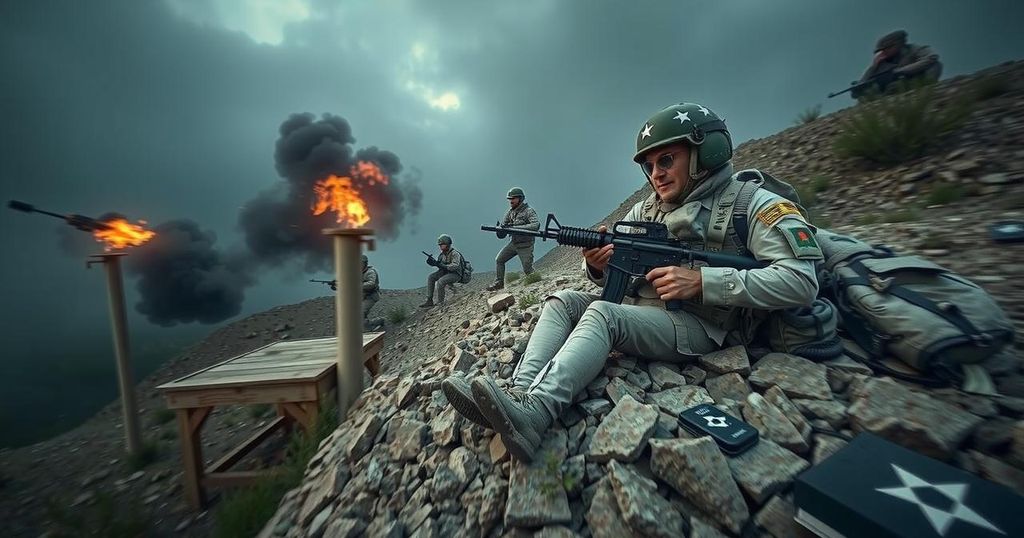Israel conducted a ground raid in Syria, capturing alleged Iranian agent Ali Soleiman al-Assi, and executed an airstrike on a Gaza clinic, injuring several individuals, amidst ongoing military operations against Hamas and Hezbollah. Prime Minister Netanyahu emphasized the need to counter Hezbollah’s influence and rearmament.
On Sunday, Israel undertook a ground raid in Syria, capturing a Syrian national, Ali Soleiman al-Assi, alleged to be linked with Iranian networks that support regional militants. This operation marks the first of its kind during the ongoing 13-month conflict in the Middle East. Although the specific location and timing of the raid were not disclosed, Israeli authorities indicated that al-Assi had been under military surveillance for several months and was involved in initiatives tied to Iran in areas near the Israeli-occupied Golan Heights. Footage released by the Israeli military depicts soldiers apprehending al-Assi within a building. Following his capture, he was transported to Israel for further interrogation. In related developments, an Israeli airstrike on a clinic in northern Gaza, where children were receiving polio vaccinations, resulted in injuries to six individuals, including four children, according to Palestinian officials, though the Israeli military denied culpability. This attack, which occurred on Saturday, adds to the ongoing violence in an area that has been heavily encircled by Israeli forces. Recently, Israel has ramped up its military operations there, leading to numerous casualties and the displacement of thousands. The Gaza Health Ministry’s Director General, Dr. Munir al-Boursh, indicated that the strike affected the Sheikh Radwan clinic in Gaza City shortly after a United Nations delegation departed the premises. Humanitarian organizations, including the World Health Organization and UNICEF, have expressed alarm regarding the incident, especially as it transpired during a designated humanitarian pause. Israeli Prime Minister Benjamin Netanyahu emphasized the necessity of pushing Hezbollah militants back beyond the Litani River, irrespective of any ceasefire agreements, citing that such actions are crucial for the safety of evacuated residents in northern Israel. Moreover, he articulated the imperative to hinder Hezbollah’s rearmament. Amid ongoing tensions, over 100 projectiles were reportedly launched from Lebanon towards Israeli territory on Sunday, with some intercepted while others landed in uninhabited regions. In the wider conflict context, Hamas’s attack on Israel on October 7, 2022, continues to influence military engagements, with reports indicating a significant death toll in Gaza.
The ongoing conflict in the Middle East has escalated significantly since October 2022, following a deadly assault by Hamas that resulted in over 1,200 Israeli casualties and the abduction of approximately 250 hostages. This incident ignited a complex and multifaceted conflict involving Israel, Hamas, and Hezbollah, leading to military operations, airstrikes, and ongoing skirmishes in the region. Israeli forces have frequently targeted locations they allege are being used by Hamas for military purposes, while Palestinian officials have accused Israel of causing mass casualties and damages to civilian infrastructure. The geopolitical interests of Iran in supporting militant organizations in the region further complicate the situation, as Israel aims to disrupt such alliances.
In summary, Israel’s recent military operations reflect ongoing tensions in the region, marked by a ground raid in Syria and a controversial airstrike on a clinic in Gaza. The situation remains volatile, with allegations and counter-allegations surrounding military actions. The broader context of the conflict continues to be influenced by historical grievances, the geopolitical strategies of regional players, and the humanitarian crises resulting from prolonged warfare.
Original Source: www.voanews.com






